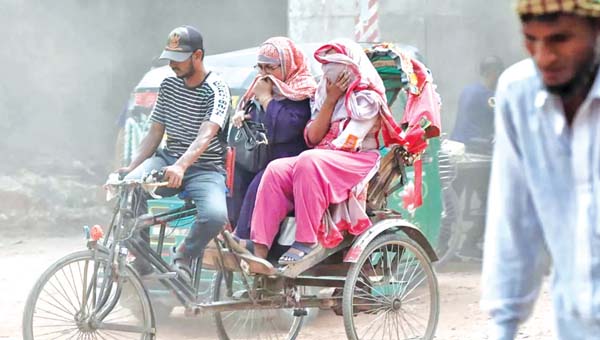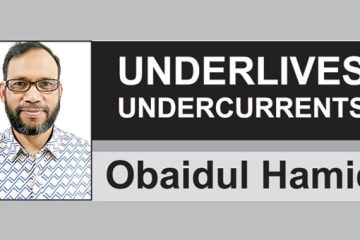Opinion
By Manik Esahak Biswas
WORLD Environmental Health Day, observed today with the theme of ‘Clean Air, Healthy People,’ serves as more than an annual observance in Bangladesh. It is a direct commentary on a national emergency. Established in 2011 by the International Federation of Environmental Health to create awareness of the link between the environment and well-being, the day holds profound significance for a nation grappling with some of the most hazardous air quality in the world. For Bangladesh, this theme is not an abstract slogan but a reflection of a daily, life-threatening reality, making the day a critical catalyst for introspection, policy reforms, and urgent collective action.
Bangladesh, especially the sprawling capital, Dhaka, consistently ranks among the world’s most polluted urban areas. The air quality crisis is a complex problem born out of a convergence of rapid, often unregulated industrialisation, urban expansion and unique meteorological conditions.
The primary sources of pollution create a toxic atmospheric cocktail. Thousands of traditional brick kilns encircling cities release vast plumes of fine particulate matter, sulphur dioxide and black carbon. The microscopic particles are especially insidious, capable of penetrating deep into the lungs and entering the bloodstream. This industrial haze is compounded by emissions from poorly maintained vehicles often running on adulterated fuel, pervasive dust from countless construction projects and the open-air burning of the municipal waste.
The pollution is then trapped by the region’s weather patterns. During the dry winter months, from October to March, a phenomenon known as temperature inversion occurs. A layer of cool air is trapped at the ground level by a warmer layer above it, preventing pollutants from dispersing. This atmospheric lid allows toxic particles to accumulate, resulting in the dense, choking smog that frequently pushes Dhaka’s Air Quality Index into the ‘hazardous’ category, with readings often exceeding 300. In stark contrast, the monsoon rains from June to September provide a temporary cleansing, washing pollutants from the air and highlighting the deep interplay between the climate and public health.
This day’s theme this year underscores the severe human cost of this environmental failure, measured in soaring rates of diseases, profound social inequity and eroding mental well-being.
The link between air pollution and diseases is stark and undeniable. Hospitals report a dramatic seasonal spike in the number of patients suffering from asthma, bronchitis, chronic obstructive pulmonary diseases and pneumonia. Children, with their developing respiratory systems, and the elderly are disproportionately affected. Beyond acute illnesses, long-term exposure to fine particulate matter is a leading risk factor for life-threatening conditions, including heart attacks, strokes and lung cancer. Studies conclusively show that this persistent exposure significantly reduces the average life expectancy of individuals in Bangladesh, placing an immense and unsustainable burden on the healthcare system and the economy.
The weight of this crisis is not distributed equally. Low-income communities, often situated near industrial zones and major construction sites, are forced to endure the highest levels of exposure, creating a profound environmental injustice. A sustainable future is impossible without ensuring that clean air is a right afforded to all citizens, not a privilege for the few.
Furthermore, the emerging concept of mental justice is critically relevant. Living under a perpetual blanket of smog, aware that every breath carries a potential risk, takes a heavy psychological toll. This can manifest as anxiety, stress and a pervasive sense of hopelessness. For children, being denied the simple joy of playing outdoors in clean air can have lasting impact on their cognitive development and mental health. Securing clean air is, therefore, inseparable from fostering society’s collective peace of mind.
Addressing air quality crisis requires a determined, multi-faceted strategy that aligns with the United Nations’ Sustainable Development Goals. This involves a bold policy, technological innovation and a fundamental shift in public consciousness.
Recommendations
Industrial and technological reform: The government must accelerate the transition from traditional brick kilns to clean, efficient technologies such as zig-zag or tunnel kilns. This can be achieved with a combination of strict enforcement and financial incentives, directly supporting SDG 11 and SDG 13. Furthermore, legally binding emission standards for all industries must be established and rigorously enforced with substantial penalties for non-compliance.
Sustainable urban development: Re-imagining urban spaces is critical. This includes massive investment in a modern, accessible public transport network, such as expanding Dhaka’s metro rail, to reduce dependency on privately owned vehicles. Simultaneously, policies promoting the adoption of electric vehicles, supported by a robust charging infrastructure, are essential. Urban planning must also prioritise the creation and protection of green spaces — parks, greenbelts and rooftop gardens — which act as natural air purifiers and improve the quality of life.
Robust governance and public engagement: Effective regulations are needed to control dust at construction sites by mandating measures like covering loose soil and washing vehicle wheels. A complete overhaul of waste management is also necessary, shifting from open-air burning to comprehensive systems for recycling, composting and waste-to-energy projects, aligning with SDG 12. Finally, sustained public awareness campaigns are crucial to inform citizens of the health risks and empower them to demand change and adopt more sustainable practices. By implementing the measures, Bangladesh will also make significant progress towards SDG 3 and SDG 16.
World Environmental Health Day 2025 is a moment of reckoning. The challenge is monumental, but the path forward is clear. It requires unwavering political will to enforce regulations, a commitment from the private sector to adopt clean technologies and active participation of civil society to hold leaders accountable.
By embedding environmental health at the heart of its development strategy, Bangladesh can transition from being a pollution hot spot to a model of sustainable progress. Achieving clean air is more than an environmental target. It is an act of social justice, an economic imperative and the most critical investment the nation can make in its people. The goal is to ensure that a healthy, breathable future is the right of every citizen.
Manik Esahak Biswas is a social development worker.







